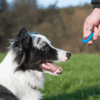If you are a dog owner, you probably know how frustrating it can be when your dog barks at night and disturbs your sleep. Not only does it affect your quality of life, but it can also indicate that your dog is unhappy, stressed, or bored. Barking is a natural and normal behavior for dogs, but excessive or inappropriate barking can be a problem that needs to be addressed.
In this article, we will explore the common causes of nighttime barking and how to deal with them effectively. We will also provide some practical tips and solutions that can help you and your dog enjoy a peaceful and quiet night.
Why Do Dogs Bark at Night?
There are many reasons why dogs bark at night, and each one requires a different approach. Some of the most common causes are:
-Attention-seeking: Some dogs bark at night because they want your attention or company. They may feel lonely, bored, or anxious, and they may try to get you to interact with them or let them out of their crate or room. This is especially common in puppies, young dogs, or dogs that are not used to being alone at night.
– Territorial behavior: Some dogs bark at night because they hear or see something outside that they perceive as a threat to their territory or family. They may bark at other animals, people, cars, or noises that trigger their instinct to protect and warn. This is more common in dogs that have a strong guarding or herding instinct, or dogs that are not well-socialized with different stimuli.
– Alarm barking: Some dogs bark at night because they are startled or scared by something that they hear or see. They may bark at sudden or loud noises, such as thunder, fireworks, or sirens, or they may bark at shadows, reflections, or lights that catch their eye. This is more common in dogs that are nervous, sensitive, or have a history of trauma or abuse.
– Separation anxiety: Some dogs bark at night because they suffer from separation anxiety, which is a condition where they feel extreme distress when they are separated from their owners or attachment figures. They may bark, whine, howl, or cry when you leave them alone at night, or when they sense that you are about to leave. They may also show other signs of anxiety, such as pacing, panting, drooling, chewing, digging, or escaping. This is more common in dogs that have a strong bond with their owners, or dogs that have experienced changes in their routine, environment, or family.
– Confinement distress: Some dogs bark at night because they are uncomfortable or unhappy with their sleeping arrangements. They may not like being confined in a crate, a room, or a certain area of the house, and they may try to get out or get your attention. They may also have physical or medical issues that make them uncomfortable, such as pain, illness, injury, or the need to eliminate. This is more common in dogs that are not used to being crated or restricted, or dogs that have special needs or requirements.
How to Stop Your Dog from Barking at Night?
The first step to stop your dog from barking at night is to identify the cause of the barking and address it accordingly. Depending on the cause, you may need to modify your dog’s environment, behavior, or routine, or seek professional help if needed. Here are some general tips and solutions for each cause:
– Attention-seeking: The best way to stop your dog from barking at night for attention is to ignore the barking and reward the quiet. Do not respond to the barking by talking, yelling, scolding, or giving in to your dog’s demands. This will only reinforce the barking and make it worse. Instead, wait until your dog stops barking, even for a few seconds, and then praise and reward your dog with a treat, toy, or attention. Repeat this process until your dog learns that barking gets them nothing, but being quiet gets them what they want. You can also teach your dog a quiet command, such as “hush” or “enough”, and use it to cue your dog to stop barking. To prevent your dog from barking for attention in the first place, make sure to provide your dog with enough physical and mental stimulation during the day, such as walks, playtime, training, or puzzle toys. Also, establish a consistent and calm bedtime routine, such as feeding, grooming, and cuddling your dog before putting them to bed. You can also give your dog a safe and durable chew toy or a stuffed Kong to keep them occupied and satisfied at night.
– Territorial behavior: The best way to stop your dog from barking at night due to territorial behavior is to block or reduce the stimuli that trigger the barking. You can do this by closing the curtains, turning off the lights, playing white noise, or moving your dog’s bed to a quieter and more secluded area of the house. You can also desensitize and countercondition your dog to the stimuli that cause the barking, such as other animals, people, or noises. This means exposing your dog to the stimuli at a low intensity and gradually increasing it, while rewarding your dog with treats, toys, or praise for staying calm and quiet. This way, your dog will learn to associate the stimuli with positive outcomes, rather than threats. You can also teach your dog a quiet command, as mentioned above, and use it to stop the barking when it occurs. To prevent your dog from barking due to territorial behavior in the first place, make sure to socialize your dog with different stimuli from an early age, or as soon as possible. Also, spaying or neutering your dog can help reduce their hormonal drive to mark and defend their territory.
– **Alarm barking**: The best way to stop your dog from barking at night due to alarm barking is to reassure and comfort your dog when they are startled or scared by something. You can do this by speaking to your dog in a calm and soothing voice, petting or cuddling your dog, or giving your dog a treat, toy, or attention. You can also block or reduce the stimuli that cause the barking, as mentioned above, or provide your dog with a safe and cozy place to sleep, such as a crate, a bed, or a blanket. You can also desensitize and countercondition your dog to the stimuli that cause the barking, as mentioned above, or teach your dog a quiet command, as mentioned above, and use it to stop the barking when it occurs. To prevent your dog from barking due to alarm barking in the first place, make sure to expose your dog to different stimuli in a positive and controlled way, and avoid exposing your dog to situations that are too overwhelming or stressful for them. Also, providing your dog with enough physical and mental exercise during the day can help reduce their anxiety and sensitivity at night.
– Separation anxiety: The best way to stop your dog from barking at night due to separation anxiety is to treat the underlying anxiety and help your dog feel more secure and confident when they are alone. This may require professional help from a veterinarian, a behaviorist, or a trainer, as separation anxiety can be a complex and serious issue. Some of the possible treatments include medication, behavior modification, or a combination of both. Behavior modification may involve desensitizing and counterconditioning your dog to being alone, teaching your dog to relax and self-soothe, or providing your dog with alternative activities or distractions when they are alone. You can also try to make your dog’s sleeping environment more comfortable and familiar, such as placing your dog’s bed near your bed, leaving some of your clothes or items with your scent, or playing some soothing music or sounds. You can also try to avoid triggering your dog’s anxiety by changing your departure and arrival cues, such as not making a big fuss when you leave or come back, or leaving and returning at random times. To prevent your dog from developing separation anxiety in the first place, make sure to teach your dog to be independent and enjoy their own company from an early age, or as soon as possible. Also, avoid leaving your dog alone for too long or too often, and provide your dog with enough physical and mental stimulation when you are together.
– Confinement distress: The best way to stop your dog from barking at night due to confinement distress is to make your dog’s sleeping arrangements more comfortable and appealing. You can do this by choosing a crate, a room, or an area that is spacious, well-ventilated, and secure. You can also make it more cozy and inviting by adding a bed, a blanket, a toy, or a water bowl. You can also train your dog to associate their sleeping place with positive experiences, such as feeding, playing, or relaxing. You can also gradually acclimate your dog to being confined, starting with short periods of time and increasing them as your dog becomes more comfortable. You can also reward your dog for being quiet and calm when they are confined, and ignore any barking or whining. You can also check your dog’s physical and medical condition, and make sure that they are not in pain, ill, injured, or in need of elimination. You can also consult your veterinarian if your dog has any special needs or requirements that may affect their comfort or well-being. To prevent your dog from barking due to confinement distress in the first place, make sure to introduce your dog to their sleeping place in a positive and gradual way, and avoid forcing or punishing your dog for being confined.
How to Stop a Dog from Barking at Night: Products and Devices
In addition to the general tips, you may also want to try some of the products and devices that are available on the market to help you stop a dog from barking at night. Here are some of the most popular and effective ones:
Anti-bark collars.
Anti-bark collars are devices that deliver a mild stimulus, such as a spray, a vibration, a sound, or a shock, to your dog when they bark. The stimulus is meant to deter your dog from barking by creating an unpleasant association. However, anti-bark collars are controversial and may not work for every dog. Some dogs may become more anxious or aggressive, or may learn to bark in a different way to avoid the stimulus. Anti-bark collars may also cause physical or psychological harm to your dog, especially if they are used incorrectly or excessively. Therefore, you should consult your veterinarian before using an anti-bark collar, and follow the instructions carefully. You should also monitor your dog’s reaction and behavior, and stop using the collar if you notice any negative effects. Some examples of anti-bark collars are this one or this one.
Anti-bark devices.
Anti-bark devices are devices that emit a high-pitched sound, an ultrasonic sound, or a citronella spray when they detect your dog’s barking. The sound or the spray is supposed to annoy or startle your dog and make them stop barking. Unlike anti-bark collars, anti-bark devices are not worn by your dog, but are placed in a certain location, such as near your dog’s bed, outside your door, or in your neighbor’s yard. Anti-bark devices may be more humane and less invasive than anti-bark collars, but they may also have some drawbacks. Some dogs may become accustomed to the sound or the spray and ignore it, or may bark more to challenge it. Some dogs may also be scared or confused by the sound or the spray and develop anxiety or phobias. Anti-bark devices may also affect other dogs or animals in the vicinity, or may not work well in noisy or windy environments. Therefore, you should use anti-bark devices with caution and supervision, and only as a temporary measure. Some examples of anti-bark devices are this one or this one.
Calming products.
Calming products are products that contain natural or synthetic ingredients that can help your dog relax and reduce their stress and anxiety. These ingredients may include pheromones, herbs, vitamins, minerals, or amino acids. Calming products may come in various forms, such as collars, sprays, diffusers, chews, treats, or supplements. Calming products may be a safer and gentler alternative to anti-bark collars or devices, but they may not work for every dog. Some dogs may not respond to the ingredients, or may have allergic reactions or side effects. Calming products may also take some time to show results, or may not be effective enough to stop your dog’s barking. Therefore, you should consult your veterinarian before using any calming products, and follow the dosage and directions carefully. You should also combine calming products with other methods, such as training or environmental changes, to address the root cause of your dog’s barking. Some examples of calming products are this one or this one.
Conclusion
Barking is a natural and normal behavior for dogs, but it can become a problem when it happens at night. Barking can disrupt your sleep, annoy your neighbors, and stress out your dog. To stop a dog from barking at night, you need to identify the cause of their barking, and apply the appropriate strategies to prevent or reduce it. You can also use some of the products and devices that can help you calm your dog and make them sleep better. By following these tips and tricks, you can enjoy a peaceful night with your furry friend.
FAQS
How to stop crying puppy at night?
Puppies may cry at night because they are separated from their mother and littermates, or because they are not used to their new environment. To stop a puppy from crying at night, you can try the following tips:
Make sure your puppy is well-fed, watered, and exercised before bedtime. This will help them feel more comfortable and tired, and reduce their need to cry.
Provide your puppy with a warm and cozy bed, preferably in a crate or a pen. This will create a safe and secure space for your puppy, and prevent them from wandering around or getting into trouble. You can also place a blanket, a toy, or a piece of clothing that smells like you or their mother in their bed, to comfort them and reduce their anxiety.
Place your puppy’s bed near your bed, or in the same room as you. This will help your puppy feel more connected to you, and less lonely or scared. You can also talk to your puppy softly, or play some soothing music or white noise, to calm them down and help them fall asleep.
Do not respond to your puppy’s crying, unless you think they need to go outside or have a medical emergency. If you give your puppy any attention, affection, or treats when they cry, you will only reinforce their behavior and make them cry more. Instead, ignore their crying and only reward them when they are quiet.
Be patient and consistent with your puppy. It may take some time for your puppy to adjust to their new home and routine, and to learn to sleep through the night. Do not scold or punish your puppy for crying, as this will only make them more fearful or stressed. Instead, praise and reward your puppy for being quiet and calm, and gradually increase the distance and time that you leave them alone at night.
How to stop a neighbour’s dog barking at night?
If your neighbour’s dog barks at night and disturbs your sleep, you can try the following tips:
Talk to your neighbour politely and respectfully. Explain to them how their dog’s barking affects you, and ask them if they can do something to stop it. You can also offer some suggestions or solutions, such as the ones mentioned in this blog post. Be empathetic and understanding, and avoid being confrontational or accusatory. Your neighbour may not be aware of their dog’s barking, or may not know how to deal with it. Try to reach a mutual agreement and cooperation with your neighbour, and thank them for their cooperation.
Use an anti-bark device, such as the ones mentioned in this blog post. You can place an anti-bark device in your yard, or near your neighbour’s fence, to deter their dog from barking. However, you should use this option with caution and discretion, as it may not work for every dog, or may cause unwanted side effects. You should also inform your neighbour before using an anti-bark device, and get their consent and approval. You should also monitor the effect of the device on the dog, and stop using it if you notice any negative consequences.
Report the problem to the authorities, if the previous tips do not work, or if your neighbour is uncooperative or hostile. You can contact your local animal control, police, or council, and file a complaint or a noise ordinance violation. You may need to provide some evidence or documentation of the dog’s barking, such as a video, a recording, or a witness statement. You may also need to follow some procedures or regulations, such as giving a written notice, a warning, or a fine to your neighbour. However, you should use this option as a last resort, as it may damage your relationship with your neighbour, or escalate the conflict.
How do I train my dog to stop whining?
To train your dog to stop whining, you need to first identify the reason why your dog is whining, and then apply the appropriate strategy to address it. Here are some common reasons and solutions for your dog’s whining:
If your dog is whining because they want something from you, such as food, water, a walk, or a toy, you need to teach them to ask politely and patiently. You can do this by ignoring their whining and only rewarding them when they are quiet and calm. You can also teach them a cue, such as “sit” or “wait”, that they have to perform before they get what they want. This way, you can redirect their whining to a more acceptable behavior.
If your dog is whining because they are seeking your attention, you need to teach them that whining does not get them what they want. You can do this by crossing your arms and turning away from your dog when they whine, and only giving them attention when they stop. You can also give them a toy or a chew to keep them busy and occupied when you are doing something else. You can also set aside some time each day to play with your dog and give them affection, so they don’t feel neglected or bored.
If your dog is whining because they are excited, you need to teach them to control their emotions and be more relaxed. You can do this by exposing your dog to the situations that trigger their excitement, such as meeting new people or animals, going for a car ride, or getting ready for a walk, and rewarding them for being calm and quiet. You can also use a cue, such as “settle” or “down”, to tell your dog to lie down and relax. You can also provide your dog with enough exercise and mental stimulation, so they don’t have excess energy to whine.
If your dog is whining because they are in pain or discomfort, you need to take them to the vet as soon as possible. Your dog may have a medical condition that needs treatment, such as an injury, an infection, a dental problem, or arthritis. Your vet can diagnose the problem and prescribe the appropriate medication or therapy for your dog. You can also make your dog more comfortable by providing them with a soft and warm bed, a heating pad, or a massage. You can also give your dog some natural or synthetic calming products, such as pheromones, herbs, or supplements, to help them cope with the pain or discomfort.
If your dog is whining because they are stressed or anxious, you need to help them overcome their fears and insecurities. You can do this by exposing your dog to the sources of their stress or anxiety, such as loud noises, strangers, or separation, and rewarding them for being brave and calm. You can also use a cue, such as “quiet” or “hush”, to tell your dog to stop whining. You can also provide your dog with a safe and secure place, such as a crate or a pen, where they can retreat and relax when they feel overwhelmed. You can also give your dog some natural or synthetic calming products, such as pheromones, herbs, or supplements, to help them cope with the stress or anxiety
If your dog is whining because they are submissive or appeasing, you need to boost their confidence and trust. You can do this by using positive reinforcement and avoiding harsh or punitive methods when training your dog. You can also avoid staring at your dog or looming over them, as these can be seen as threatening gestures. You can also provide your dog with plenty of socialization and exposure to different situations, people, and animals, and reward them for being confident and friendly. You can also give your dog some natural or synthetic calming products, such as pheromones, herbs, or supplements, to help them cope with the submissiveness or appeasement
By following these tips and tricks, you can train your dog to stop whining and communicate with you in a more appropriate way. Remember to be patient and consistent with your dog, and praise and reward them for being quiet and calm.
Related Posts
Are Dogs Allowed In CVS?
March 22, 2024• Dog
Are Dogs Allowed in Duane Reade?
March 22, 2024• Dog
Natural Dewormers for Dogs: Safe and Effective
March 15, 2024• Dog, Dog Health
How Do I Comfort My Dog After Neutering?
March 6, 2024• Dog, Dog Health
Dog Rubs Face on Carpet: A Guide to Why
March 5, 2024• Dog















Thank you for your sharing. I am worried that I lack creative ideas. It is your article that makes me full of hope. Thank you. But, I have a question, can you help me?
Sure why not Please ask your question.